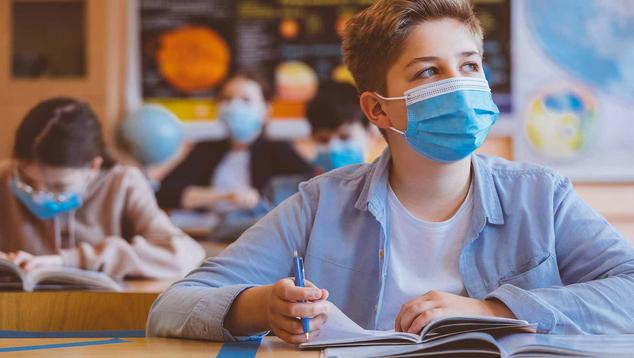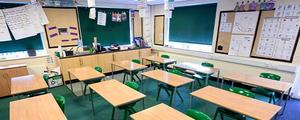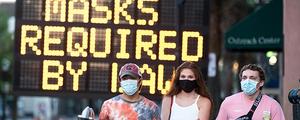Story Highlights
- 36% want full-time in-person instruction; 28% want full-time remote learning
- More parents concerned about children catching the coronavirus
- A growing percentage of concerned parents want full-time remote learning
WASHINGTON, D.C. -- As U.S. coronavirus infections and parents' concerns about their children catching COVID-19 have surged, parents' preferences for school attendance this year have shifted.
In late May and early June, a majority of 56% of K-12 parents wanted full-time in-person school this fall. Now, 36% prefer this option. Meanwhile, 28% of parents, up from 7% in the prior survey, prefer full-time remote instruction. The remainder, 36%, favor a hybrid system of part in-person teaching and part distance learning.
| May 25-Jun 8, 2020 | Jul 13-27, 2020 | ||||||||||||||||||||||||||||||||||||||||||||||||||||||||||||||||||||||||||||||||||||||||||||||||||
|---|---|---|---|---|---|---|---|---|---|---|---|---|---|---|---|---|---|---|---|---|---|---|---|---|---|---|---|---|---|---|---|---|---|---|---|---|---|---|---|---|---|---|---|---|---|---|---|---|---|---|---|---|---|---|---|---|---|---|---|---|---|---|---|---|---|---|---|---|---|---|---|---|---|---|---|---|---|---|---|---|---|---|---|---|---|---|---|---|---|---|---|---|---|---|---|---|---|---|---|
| % | % | ||||||||||||||||||||||||||||||||||||||||||||||||||||||||||||||||||||||||||||||||||||||||||||||||||
| Full-time in-person school | 56 | 36 | |||||||||||||||||||||||||||||||||||||||||||||||||||||||||||||||||||||||||||||||||||||||||||||||||
| Part-time in-person school with some distance learning | 37 | 36 | |||||||||||||||||||||||||||||||||||||||||||||||||||||||||||||||||||||||||||||||||||||||||||||||||
| Full-time distance/remote learning | 7 | 28 | |||||||||||||||||||||||||||||||||||||||||||||||||||||||||||||||||||||||||||||||||||||||||||||||||
| Based on parents of U.S. K-12 schoolchildren | |||||||||||||||||||||||||||||||||||||||||||||||||||||||||||||||||||||||||||||||||||||||||||||||||||
| Gallup Panel | |||||||||||||||||||||||||||||||||||||||||||||||||||||||||||||||||||||||||||||||||||||||||||||||||||
The July 13-27 Gallup Panel survey results come as governors, school officials and parents decide how best to educate children amid the coronavirus pandemic.
After nearly all U.S. schools relied on remote learning to finish the 2019-2020 school year, the Trump administration has insisted that all children should attend school in person this fall. But some larger school districts in COVID-19 hot spots have already decided they will have full-time remote learning in the fall, something President Donald Trump recently acknowledged may be necessary despite his administration's preferences. Organizations representing pediatricians, superintendents and teachers recently urged leaders to base decisions about reopening schools on the recommendations of local public health officials, educators and parents.
When Gallup last asked this question in late May and early June, parents' preferences for full-time in-person schooling largely conformed with their experiences with remote learning at the end of the 2019-2020 school year. At that time, 56% said their children's distance learning was difficult for them, while 44% said it was easy.
Parents' preferences for 2020-2021 schooling at that time were also largely shaped by their concern about their children getting the coronavirus. Now, more parents are concerned about their children getting the coronavirus, with 64% worried (up from 46%), including 27% who are "very worried" (up from 12%).
| May 25-Jun 8, 2020 | Jul 13-27, 2020 | ||||||||||||||||||||||||||||||||||||||||||||||||||||||||||||||||||||||||||||||||||||||||||||||||||
|---|---|---|---|---|---|---|---|---|---|---|---|---|---|---|---|---|---|---|---|---|---|---|---|---|---|---|---|---|---|---|---|---|---|---|---|---|---|---|---|---|---|---|---|---|---|---|---|---|---|---|---|---|---|---|---|---|---|---|---|---|---|---|---|---|---|---|---|---|---|---|---|---|---|---|---|---|---|---|---|---|---|---|---|---|---|---|---|---|---|---|---|---|---|---|---|---|---|---|---|
| % | % | ||||||||||||||||||||||||||||||||||||||||||||||||||||||||||||||||||||||||||||||||||||||||||||||||||
| Very worried | 12 | 27 | |||||||||||||||||||||||||||||||||||||||||||||||||||||||||||||||||||||||||||||||||||||||||||||||||
| Somewhat worried | 34 | 37 | |||||||||||||||||||||||||||||||||||||||||||||||||||||||||||||||||||||||||||||||||||||||||||||||||
| Not too worried | 34 | 22 | |||||||||||||||||||||||||||||||||||||||||||||||||||||||||||||||||||||||||||||||||||||||||||||||||
| Not worried at all | 20 | 14 | |||||||||||||||||||||||||||||||||||||||||||||||||||||||||||||||||||||||||||||||||||||||||||||||||
| Based on parents of U.S. K-12 schoolchildren | |||||||||||||||||||||||||||||||||||||||||||||||||||||||||||||||||||||||||||||||||||||||||||||||||||
| Gallup Panel | |||||||||||||||||||||||||||||||||||||||||||||||||||||||||||||||||||||||||||||||||||||||||||||||||||
Parents who are not concerned about their children contracting the virus still widely favor in-person school, with 74% doing so, little changed from 79% at the end of the past school year.
But almost as many parents who are concerned now favor full-time remote learning (42%) as favor the hybrid approach (44%). In the prior survey, a majority of concerned parents favored the hybrid approach, and only 12% preferred full-time distance learning. Concerned parents were disinclined in that survey to want full-time in-person schooling (29%), and are even less in favor of it now (15%).
| May 25-Jun 8, 2020 | Jul 13-27, 2020 | |||||||||||||||||||||||||||||||||||||||||||||||||||||||||||||||||||||||||||||||||||||||||||||||||||
|---|---|---|---|---|---|---|---|---|---|---|---|---|---|---|---|---|---|---|---|---|---|---|---|---|---|---|---|---|---|---|---|---|---|---|---|---|---|---|---|---|---|---|---|---|---|---|---|---|---|---|---|---|---|---|---|---|---|---|---|---|---|---|---|---|---|---|---|---|---|---|---|---|---|---|---|---|---|---|---|---|---|---|---|---|---|---|---|---|---|---|---|---|---|---|---|---|---|---|---|---|
| % | % | |||||||||||||||||||||||||||||||||||||||||||||||||||||||||||||||||||||||||||||||||||||||||||||||||||
| Worried children will get coronavirus | ||||||||||||||||||||||||||||||||||||||||||||||||||||||||||||||||||||||||||||||||||||||||||||||||||||
| Full-time in-person school | 29 | 15 | ||||||||||||||||||||||||||||||||||||||||||||||||||||||||||||||||||||||||||||||||||||||||||||||||||
| Part-time school with some distance learning | 59 | 44 | ||||||||||||||||||||||||||||||||||||||||||||||||||||||||||||||||||||||||||||||||||||||||||||||||||
| Full-time distance learning | 12 | 42 | ||||||||||||||||||||||||||||||||||||||||||||||||||||||||||||||||||||||||||||||||||||||||||||||||||
| Not worried children will get coronavirus | ||||||||||||||||||||||||||||||||||||||||||||||||||||||||||||||||||||||||||||||||||||||||||||||||||||
| Full-time in-person school | 79 | 74 | ||||||||||||||||||||||||||||||||||||||||||||||||||||||||||||||||||||||||||||||||||||||||||||||||||
| Part-time school with some distance learning | 18 | 22 | ||||||||||||||||||||||||||||||||||||||||||||||||||||||||||||||||||||||||||||||||||||||||||||||||||
| Full-time distance learning | 2 | 4 | ||||||||||||||||||||||||||||||||||||||||||||||||||||||||||||||||||||||||||||||||||||||||||||||||||
| Based on parents of U.S. K-12 schoolchildren | ||||||||||||||||||||||||||||||||||||||||||||||||||||||||||||||||||||||||||||||||||||||||||||||||||||
| Gallup Panel | ||||||||||||||||||||||||||||||||||||||||||||||||||||||||||||||||||||||||||||||||||||||||||||||||||||
Thus, to a large degree, the shift away from in-person learning reflects the increased worry among parents since late May and early June, when U.S. coronavirus infections were much lower than today.
Parents residing in the West (74%) are more worried about their children getting the coronavirus than parents in the Northeast (65%), South (62%) and Midwest (52%), with increases of between 14 and 25 percentage points since the prior survey in all regions.
Western parents (27%) and those in the Northeast (27%) are least likely to favor full-time in-person instruction. Four in 10 parents in the South and 51% of those in the Midwest prefer their children attend full-time in-person school this fall. Thirty percent of Western parents want full-time remote learning, and 43% want a hybrid system.
As with many aspects of the coronavirus pandemic, attitudes are shaped to a large degree by politics. Eighty-five percent of parents who identify as Democrats and 29% who identify as Republicans are worried about their child getting COVID-19. About two-thirds of Republican parents, versus 13% of Democrats, want full-time in-person instruction for their children this fall. Democratic parents are mostly divided in their preference between full-time remote learning and a modified system.
| Republicans | Independents | Democrats | ||||||||||||||||||||||||||||||||||||||||||||||||||||||||||||||||||||||||||||||||||||||||||||||||||
|---|---|---|---|---|---|---|---|---|---|---|---|---|---|---|---|---|---|---|---|---|---|---|---|---|---|---|---|---|---|---|---|---|---|---|---|---|---|---|---|---|---|---|---|---|---|---|---|---|---|---|---|---|---|---|---|---|---|---|---|---|---|---|---|---|---|---|---|---|---|---|---|---|---|---|---|---|---|---|---|---|---|---|---|---|---|---|---|---|---|---|---|---|---|---|---|---|---|---|---|---|
| % | % | % | ||||||||||||||||||||||||||||||||||||||||||||||||||||||||||||||||||||||||||||||||||||||||||||||||||
| Concern about child getting COVID-19: | ||||||||||||||||||||||||||||||||||||||||||||||||||||||||||||||||||||||||||||||||||||||||||||||||||||
| Very worried | 9 | 22 | 42 | |||||||||||||||||||||||||||||||||||||||||||||||||||||||||||||||||||||||||||||||||||||||||||||||||
| Somewhat worried | 20 | 43 | 43 | |||||||||||||||||||||||||||||||||||||||||||||||||||||||||||||||||||||||||||||||||||||||||||||||||
| Not too worried | 37 | 23 | 12 | |||||||||||||||||||||||||||||||||||||||||||||||||||||||||||||||||||||||||||||||||||||||||||||||||
| Not worried at all | 33 | 12 | 3 | |||||||||||||||||||||||||||||||||||||||||||||||||||||||||||||||||||||||||||||||||||||||||||||||||
| Preference for fall schooling: | ||||||||||||||||||||||||||||||||||||||||||||||||||||||||||||||||||||||||||||||||||||||||||||||||||||
| Full-time in-person school | 68 | 40 | 13 | |||||||||||||||||||||||||||||||||||||||||||||||||||||||||||||||||||||||||||||||||||||||||||||||||
| Part-time school with some distance learning | 22 | 35 | 46 | |||||||||||||||||||||||||||||||||||||||||||||||||||||||||||||||||||||||||||||||||||||||||||||||||
| Full-time distance learning | 11 | 25 | 41 | |||||||||||||||||||||||||||||||||||||||||||||||||||||||||||||||||||||||||||||||||||||||||||||||||
| Gallup Panel, July 13-27, 2020 | ||||||||||||||||||||||||||||||||||||||||||||||||||||||||||||||||||||||||||||||||||||||||||||||||||||
In late May and early June, 10% of Democrats preferred full-time distance learning, with 33% opting for full-time in-person instruction and 57% for a hybrid approach. Republicans' preferences have changed less significantly since then, with more now wanting full-time remote learning than in the prior survey (11% vs. 3%, respectively) and fewer wanting full-time in-person teaching (68% vs. 82%). Also, in the prior survey, the majority of independents, 63%, wanted full-time in-person instruction, with 7% wanting full-time remote learning.
Implications
As students begin their school year, they will be doing so at a time of great uncertainty, as school leaders and parents attempt to balance student and teacher safety needs with student educational needs. With coronavirus infections on the rise in many parts of the country, the decisions have become even more difficult.
The Centers for Disease Control recently released guidelines for how schools can safely administer in-person instruction. Those guidelines may be challenging to implement in practice and likely would require additional funding. Schools that opt for in-person instruction face the added challenge of devising plans for how to continue in-person instruction if students, teachers or their family members become infected with the coronavirus.
School districts are likely to adopt different approaches depending on their area's circumstances. But regardless of what course they choose, they will need to be adaptable in the event that circumstances change.
Learn more about how the Gallup Panel works.




